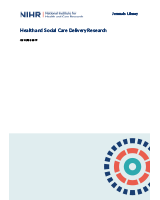This work was produced by Fitzpatrick et al. under the terms of a commissioning contract issued by the Secretary of State for Health and Social Care. This is an Open Access publication distributed under the terms of the Creative Commons Attribution CC BY 4.0 licence, which permits unrestricted use, distribution, reproduction and adaptation in any medium and for any purpose provided that it is properly attributed. See: https://creativecommons.org/licenses/by/4.0/. For attribution the title, original author(s), the publication source – NIHR Journals Library, and the DOI of the publication must be cited.
NCBI Bookshelf. A service of the National Library of Medicine, National Institutes of Health.
Fitzpatrick JM, Rafferty AM, Hussein S, et al. Challenges and guidance for implementing social distancing for COVID-19 in care homes: a mixed methods rapid review. Southampton (UK): National Institute for Health and Care Research; 2024 Nov. (Health and Social Care Delivery Research, No. 12.45.)

Challenges and guidance for implementing social distancing for COVID-19 in care homes: a mixed methods rapid review.
Show detailsIntroduction
Drawing on the findings of phases 1 and 2 and in collaboration with multiple stakeholders, we developed a toolkit of evidence-informed guidance and resources to support social distancing and isolation for CH residents (see Chapter 2 for method).
Participants
Two online, half-day, participatory workshops were convened. A total of 27 external members were recruited, comprising 10 PPI group members, 10 CH staff (7 CH managers/deputy managers, 1 team leader, 1 care worker and 1 practice development facilitator), 1 Associate Director of Nursing of a large NHS Foundation Trust, 3 professional representatives from the Steering Committee and 3 professional representatives from the Data Monitoring and Ethics Committee. Details of the external members who were able to attend each workshop are provided in Table 5.
TABLE 5
Membership of the co-design workshops
Co-design events
At Workshop 1, participants discussed the study findings with reference to several trigger questions (see Appendix 2). A synthesis of this workshop is presented in Table 6.
TABLE 6
Synthesis of Workshop 1 discussions
Overview of Workshop 1 discussions
These data sources and discussions informed the development of the draft content, which was organised around six areas, grouped into three sections:
- Section 1 – Caring for Residents: caring for residents when they are social distancing; caring for residents when they are isolating.
- Section 2 – Caring for Families and Friends: supporting residents, families and friends to communicate when visiting is not permitted; supporting visits from families and friends when visiting is allowed but with restrictions.
- Section 3 – Caring for CH Staff: caring for care staff; caring for managers.
For each area, ‘consequences’ and ‘actions to consider’ were presented with illustrative data extracts and case studies.
This draft content was the focus of Workshop 2; a synthesis of Workshop 2 discussions is presented in Table 7.
TABLE 7
Synthesis of Workshop 2 discussions
Overview of Workshop 2 discussions
A third and final co-design activity involved sharing a further version of the draft content of the toolkit with stakeholders drawn from Workshops 1 and 2 [PPI group members × 10, CH managers × 2, Associate Director of Nursing × 1, Director of Clinical Services (Dementia UK) × 1, project team members × 8]. The final draft toolkit (presented in Appendix 5) comprises a section for Residents, Families and Friends, and CH staff with each section addressing two key areas. For each area, content is organised around three headers: ‘what is the issue?’, ‘what we have learnt’ and ‘you could try this’. Data extracts and case studies are incorporated and links to resources and organisations (see Boxes 1 and 2 for examples of the key areas related to caring for residents). The toolkit is intended to be used flexibly with staff, residents, families and friends to support health and care delivery by the following:
BOX 1
Key findings for caring for residents when they are social distancing
BOX 2
Key findings for caring for residents when they are isolating
- contributing to person-centred care for residents, families and friends by providing evidence-informed guidance for social distancing and isolation of residents and related restrictions;
- support CHs to care for residents with diverse health and care needs (e.g. those living with dementia);
- support CHs to communicate well with residents, families and friends, and health and care professionals;
- help direct focus on staff well-being;
- help make the job easier for CHs during a pandemic;
- help inform care for other infectious diseases.
The toolkit will be free to download from the project webpage, and the film will be free to view from the project webpage.
- A toolkit supporting care homes with social distancing and isolation (Objective ...A toolkit supporting care homes with social distancing and isolation (Objective 5) - Challenges and guidance for implementing social distancing for COVID-19 in care homes: a mixed methods rapid review
Your browsing activity is empty.
Activity recording is turned off.
See more...